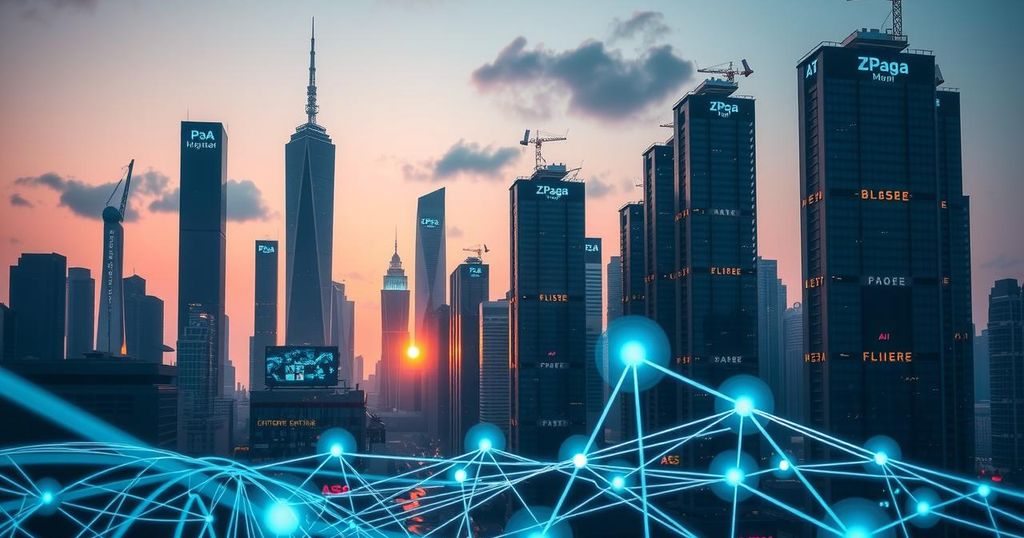Geopolitical Dynamics of AI: Focus on the Paris AI Action Summit

The Paris AI Action Summit will focus on the geopolitics of artificial intelligence, with significant participation from world leaders and industry executives to discuss ethical governance and the rapid advancements in AI technology, particularly following the launch of China’s DeepSeek chatbot. The event aims to promote a collaborative international approach while addressing the varying interests of attending nations, especially the U.S. and China.
The geopolitics surrounding artificial intelligence (AI) is set to take center stage at an upcoming summit in Paris, where international leaders and experts will discuss the future and governance of AI. This summit comes amidst significant developments, including China’s newly launched budget-friendly DeepSeek chatbot, which is garnering attention and innovation in the industry. U.S. Vice President JD Vance is attending, while China’s President Xi Jinping will send a special envoy, emphasizing the high stakes involved.
The Paris AI Action Summit, co-hosted by French President Emmanuel Macron and Indian Prime Minister Narendra Modi, will convene heads of state, corporate executives, and researchers to explore how AI can promote global welfare while mitigating its risks. Notable attendees include European Commission President Ursula von der Leyen and CEOs from various leading companies. Panel discussions and social events will facilitate dialogue on AI safety and ethical considerations.
As generative AI continues to evolve at a rapid pace two years after the launch of ChatGPT, the summit aims to reinforce commitments to address risks associated with this technology. Previous summits produced commitments to enhance AI safety and foster international cooperation, but the Paris summit will expand the debate to encompass a wider range of issues, seeking to establish orderly governance in AI practices.
Key outcomes sought by organizers include a joint political declaration advocating for ethical, democratic, and environmentally sustainable AI practices, although the U.S.’s agreement on this is uncertain. Another objective involves establishing a public-interest partnership for AI, with efforts to raise substantial funds for improved access to trusted AI resources, thereby addressing pressing global challenges.
Former President Donald Trump has expressed ambitions to position the U.S. as a leading force in AI, focusing on reducing regulatory barriers and ensuring the U.S. maintains its competitive edge. However, his administration’s stance may complicate multilateral agreements, as challenges arise over the varied breadth of topics encompassed at the summit.
China’s active participation at the summit, with Vice Premier Zhang Guoqing representing President Xi Jinping, marks a strategic shift as the Chinese government seeks greater influence in AI governance. The introduction of DeepSeek has intensified the competition in AI technology between the U.S. and China, prompting discussions on issues such as data privacy and security.
Transatlantic tensions are anticipated to arise as regulatory challenges persist, particularly for U.S.-based tech giants facing scrutiny from European authorities. Issues surrounding AI regulations within the EU have been met with resistance from major companies, highlighting the complexities involved in establishing harmonized standards that could impact the development of AI regulations.
Artificial intelligence continues to evolve rapidly, presenting both significant opportunities and challenges. Global summits hosted by various nations aim to foster discussion and establish governance mechanisms to harness AI’s potential effectively. The competition between the U.S. and China in AI technology has implications for international collaboration, regulatory standards, and ethical use of AI. With notable developments like the DeepSeek chatbot from China, the dynamics of AI governance are further complicated, necessitating coordinated efforts among countries to address the associated risks and leverage benefits.
The upcoming Paris summit on artificial intelligence highlights the urgent need for international cooperation in navigating the complexities of AI technology, especially in light of China’s advancements with DeepSeek. As world leaders and industry experts convene to discuss ethical guidelines and safety measures, the divergent approaches of nations, particularly the U.S. under Trump, may challenge efforts to achieve a cohesive global governance framework. The future of AI governance depends on balancing innovation with safety, ethics, and inclusivity.
Original Source: apnews.com




